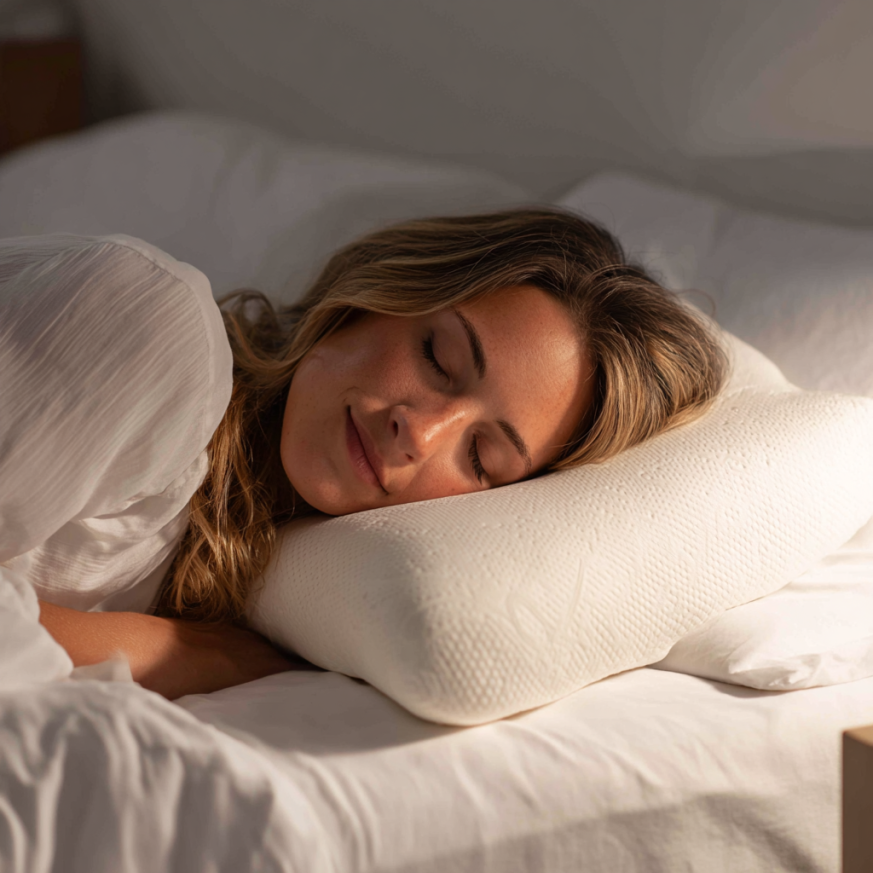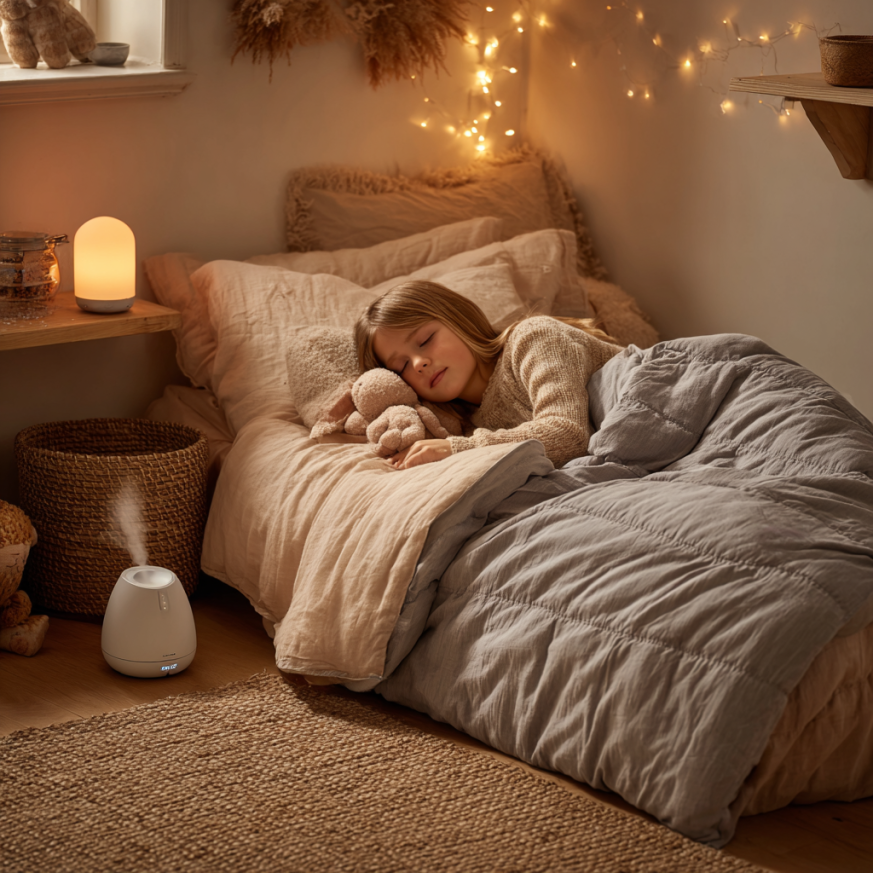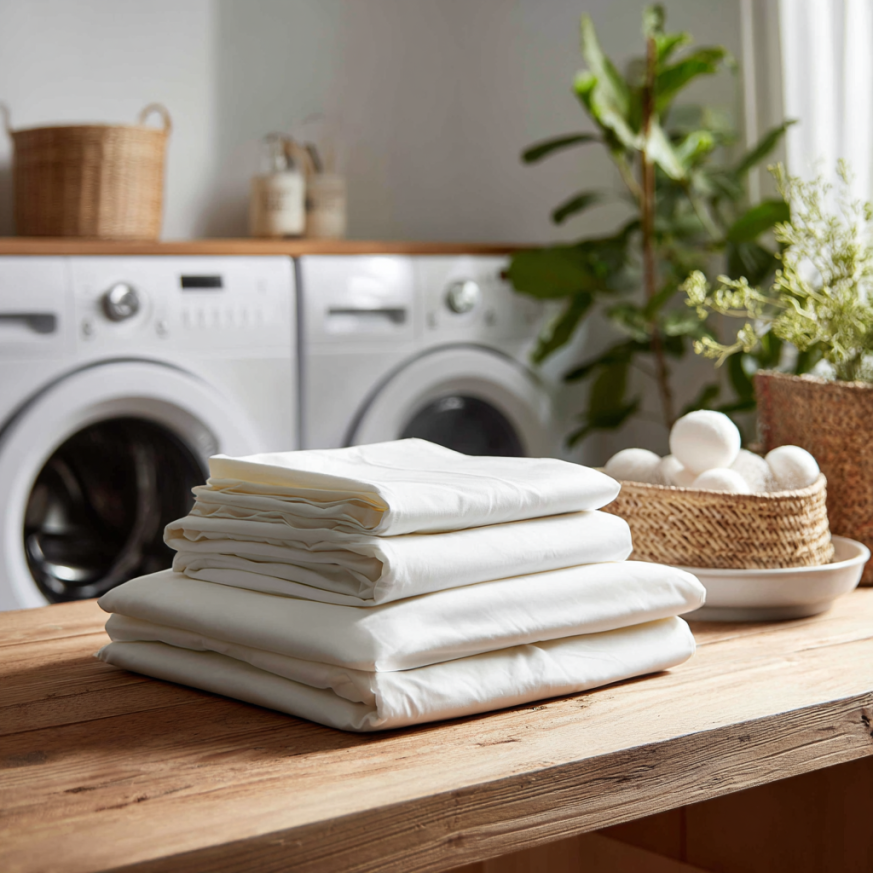Bedding and Health: How Your Bedding Impacts Sleep and Wellness
Bedding and health are deeply connected — the right mattress, pillow, and sheets can dramatically improve sleep quality and overall wellness. From breathable fabrics to ergonomic designs, your bedding choices shape the comfort, temperature, and support your body experiences every night. In this guide, we’ll explore how simple upgrades to your sleep setup can lead to profound improvements in how you feel — both in and out of bed. The connection between bedding and health is more than comfort — it’s a foundation for restorative, energizing sleep.
Key Takeaways
- Choosing the right bedding can improve sleep quality, reduce pain, and enhance overall wellness.
- A medium-firm mattress with adjustable inflation is recommended for optimal spinal support and pressure relief.
- The right pillow can prevent neck pain and shoulder stiffness by promoting healthy spinal alignment.
- Sheets made of breathable fabrics like cotton and linen can help regulate body temperature during sleep.
- Weighted blankets have been shown to improve sleep quality and relaxation, positively impacting bedding and health.
The Importance of Sleep Hygiene for Better Health
Good sleep hygiene begins with your environment. When your bedding is clean, soft, and temperature-regulating, your brain receives the right signals to wind down. Avoid synthetic fabrics that trap heat and irritate the skin. Instead, focus on materials that work in harmony with your body, like organic cotton or bamboo. Consider pairing a breathable comforter with light, moisture-wicking sheets. Small tweaks like these can help you fall asleep faster and stay asleep longer. Add in calming scents like lavender or eucalyptus to support the ritual.
The Science Behind Sleep and Its Impact on Health
Modern sleep science shows how crucial sleep is to every function in the body — from hormone regulation to tissue regeneration. But without the right bedding, your body may struggle to maintain the deep and REM stages of sleep. For instance, low-quality bedding can increase cortisol levels, leading to more nighttime awakenings. Your bedding material choices — essential for balancing bedding and health — can support your body’s restorative processes. Wool bedding from The Wool Room offers natural hypoallergenic and moisture-wicking properties ideal for deeper sleep.
The Sleep Cycle
Your sleep cycle involves transitions between light, deep, and REM stages. Disruptions in these cycles — often due to overheating, pressure points, or allergens — can prevent you from feeling rested. That’s where bedding plays a subtle yet powerful role. Think of your bedding as a sleep aid: from sheets that reduce friction, to mattresses that contour without sinking, each component ensures a smoother, more complete cycle. The right bedding acts like a silent partner supporting the rhythm of your night. Maintain sheet choice harmony for the most restorative results.
The Importance of Healthy Sleep Duration
Doctors recommend 7–9 hours of sleep for most adults, but achieving that is difficult without the right environment. Thread count quality matters — better fabrics and support promote longer, deeper sleep. Overly stiff or itchy bedding may cause unconscious tossing and turning that shortens your total rest time. According to Healthline, clean sheets also help prevent skin irritation and allergens that disrupt sleep cycles. Consider using layered bedding so you can adjust easily during seasonal changes.
Choosing the Right Mattress for Better Sleep Health
A mattress that’s too soft can misalign the spine; one that’s too firm can create pressure points. That’s why a medium-firm mattress, especially with adjustable inflation, offers ideal support. It cradles pressure-sensitive areas like shoulders and hips while promoting spinal alignment. Innovations like dual-zone beds or those featured in SmartLinen’s 2025 hotel bedding trends are worth exploring if you share your bed with a partner or suffer from back pain. Don’t forget a mattress protector — it adds both hygiene and comfort value.

The Impact of Pillows on Sleep and Neck Health
Whether you’re a side, back, or stomach sleeper, your pillow should keep your spine neutral. Too high, and your neck bends unnaturally; too low, and you lose support. Memory foam and latex options often provide the best shape retention. Down pillows, while luxurious, may not offer enough lift for side sleepers. Also consider pillow protectors to reduce allergen exposure — an often-overlooked link between bedding and health. Rotating your pillow every six months can also preserve support and cleanliness.

Bedsheets and Sleepwear: Influence on Sleep Comfort and Regulation
When it comes to selecting the perfect bed linen, breathability and softness go hand in hand. Natural fibers like cotton, linen, and Tencel not only feel good but also promote thermoregulation. This reduces night sweats and overheating, two common causes of sleep disruption. Comfortable, moisture-wicking sleepwear complements the effect. Brands like Peacock Alley’s Linenry merge function with aesthetic, offering style-conscious consumers breathable solutions that improve comfort and sleep duration.

The Impact of Weighted Blankets on Sleep Quality
Weighted blankets use deep pressure stimulation to trigger the parasympathetic nervous system, helping you feel safe and grounded. They’re particularly useful for those with anxiety or insomnia. By promoting serotonin and melatonin production, weighted blankets help your brain wind down faster. Choose a weight that’s about 10% of your body weight for best results. Anecdotal tips from Grandmother’s Home Blog highlight the comforting benefits of layering weighted fabrics with warm, earthy tones for a homey feel that supports mental wellbeing.

Maintaining Clean and Allergen-Free Bedding for Better Sleep Health
Allergens, dust mites, and bacteria can accumulate quickly, especially in humid environments. One of the simplest ways to protect your bedding and health is through consistent maintenance. Wash sheets weekly in hot water, vacuum your mattress monthly, and replace pillows annually. Invest in mattress and pillow protectors to extend the life of your bedding. For fresh bedroom design and health-first habits, Apartment Therapy offers practical tips that merge aesthetics with air quality and sleep hygiene improvements.

Conclusion
This holistic approach links your sleep environment to overall wellness, grounding the connection between bedding and health. By choosing supportive mattresses, breathable sheets, and properly aligned pillows, you’re investing in both your nighttime comfort and daytime vitality. Even small upgrades — like changing fabrics or improving cleanliness — have a lasting impact. Invest in your sleep space, and you invest in your quality of life.
FAQ
- What is the best type of mattress for health and comfort?
- Experts recommend a medium-firm mattress with adjustable inflation for optimal spinal support and pressure relief. Consider body type and sleeping position when choosing.
- How often should bedding be washed for better health?
- Sheets should be washed weekly in hot water. Pillows should be cleaned every 3–6 months, and mattress protectors should be washed monthly.
- What are the best fabrics for breathable sheets?
- Natural fibers like cotton, linen, and bamboo are excellent choices. They promote airflow, wick away moisture, and help regulate body temperature during sleep.
- Can a weighted blanket really improve sleep?
- Yes. Weighted blankets use deep pressure stimulation to calm the nervous system, helping reduce anxiety and improve sleep depth and duration.
- How do pillows affect spinal alignment?
- Pillows that match your sleep position (back, side, or stomach) help maintain neutral spine alignment and reduce neck pain or stiffness.
